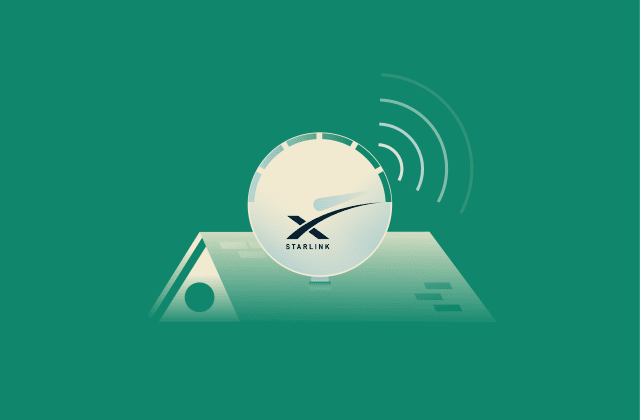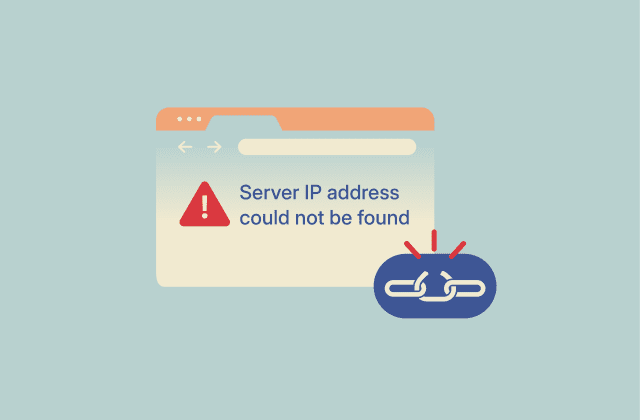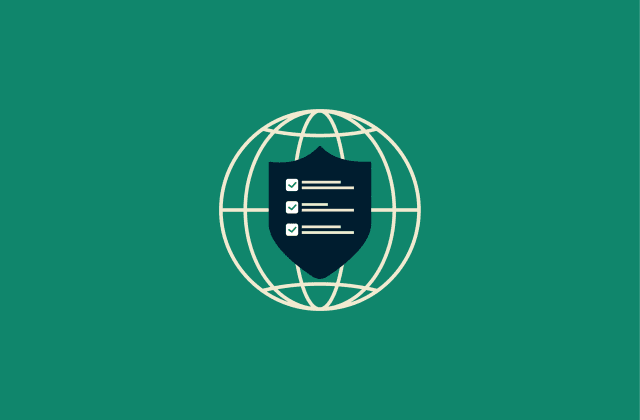WireGuard vs. IPsec: Which VPN protocol is better?
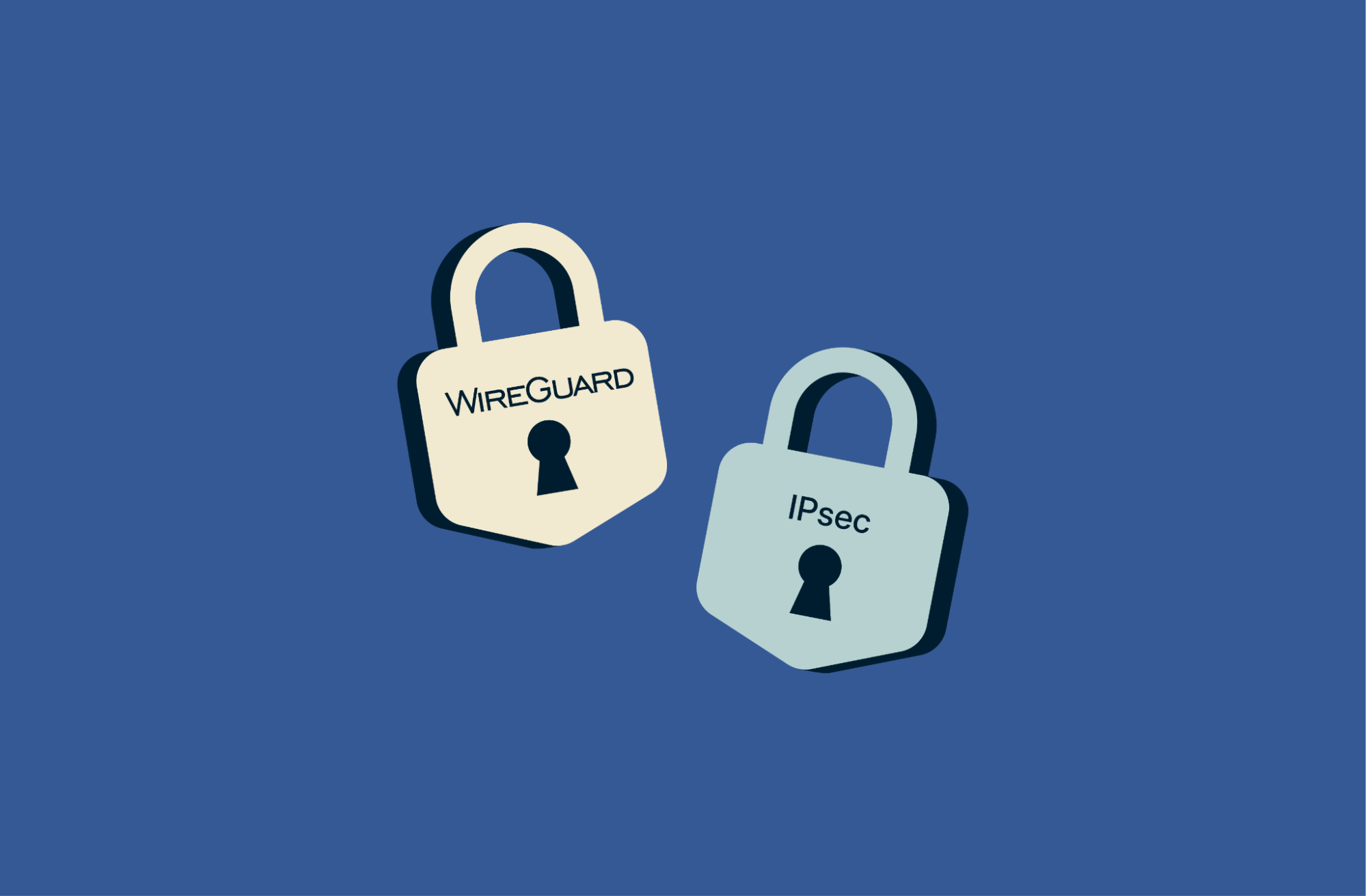
When it comes to VPN security, stability, and speed, the protocol you choose can make or break your online experience. As such, it’s important to know the differences between the top options, so you know which one is right for you.
WireGuard and Internet Protocol Security (IPsec) are both popular VPN choices. While they perform similar functions, they differ in many ways. WireGuard, introduced about a decade ago, has quickly gained traction in the VPN industry thanks to its speed and simplicity. IPsec, on the other hand, has been around much longer and is well established as an enterprise-friendly option.
How do they differ, and which one should you choose? Read on through our WireGuard vs. IPsec comparison to find out.
What is IPsec, and how does it work?
IPsec isn’t a single VPN protocol but a framework made up of multiple standards. Together, these standards define how data packets are encrypted, encapsulated, and transmitted securely across IP networks. In simple terms, IPsec lays down the rules for protecting your traffic as it moves from point A to point B.
Developed by the Internet Engineering Task Force (IETF) and introduced in the 1990s, IPsec has been around for decades and has established itself as one of the go-to options for internet security. It’s integrated into several major operating systems, like Windows and Android, and boasts exceptional compatibility with various platforms and devices.
From a VPN perspective, IPsec is almost never used on its own but instead combined with other protocols, like Internet Key Exchange version 2 (IKEv2) or Layer 2 Tunneling Protocol (L2TP). Because of this, the exact way it works can vary quite a lot from one implementation to the next, depending on its configuration. A typical session typically involves these core steps:
- Initiation: One host sends interesting traffic (traffic that requires protection) to another.
- Phase one: Routers at each end of the connection are authenticated using the Internet Key Exchange (IKE) protocol, and a secure channel forms between them.
- Phase two: The client and server negotiate which IPsec Security Associations (SAs) they will use to encrypt and decrypt the data.
- Transmission: The data then passes through the secure tunnel from one end to the other.
- Termination: The tunnel is eventually timed out, shut down, or expired.
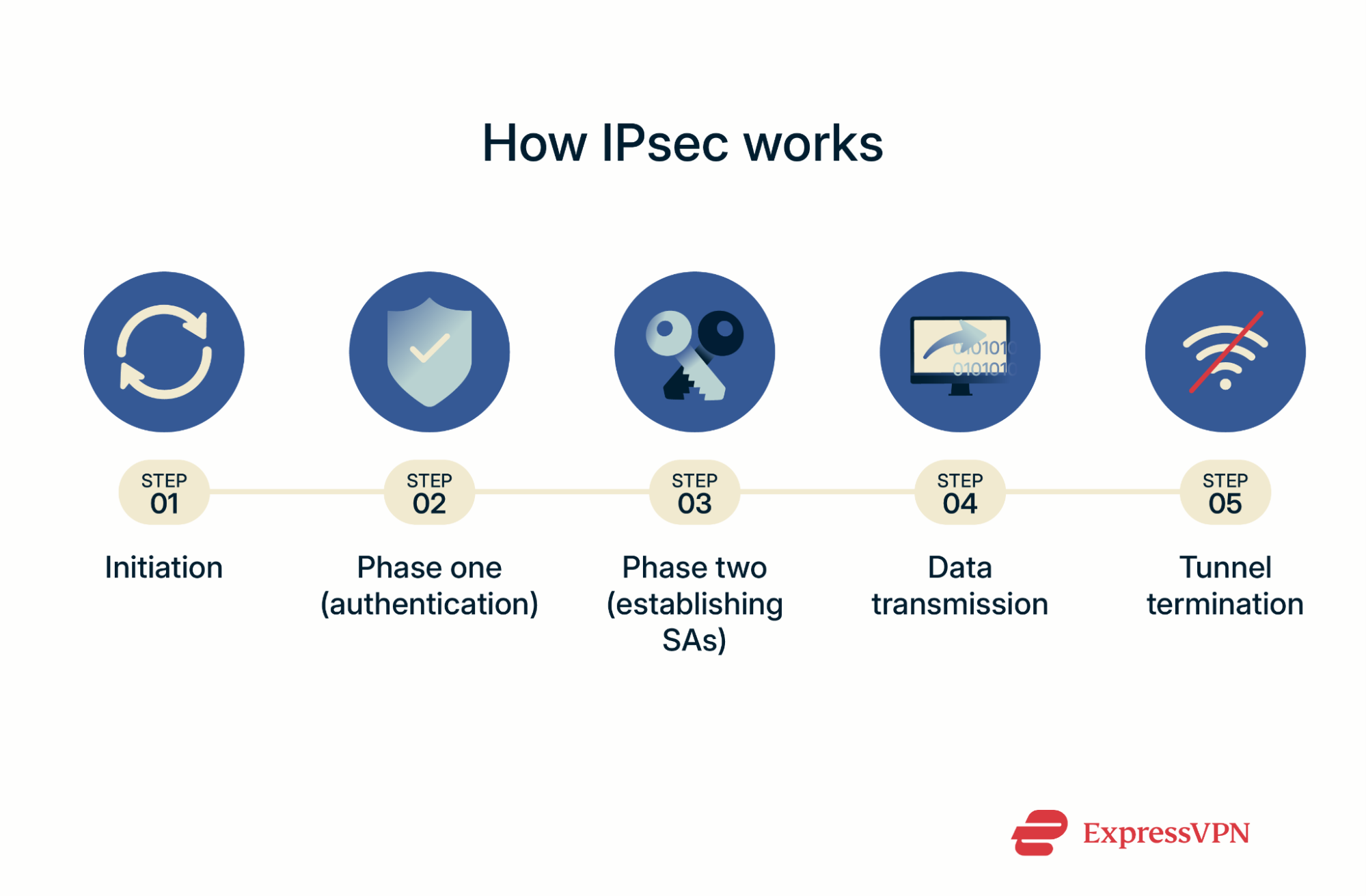 IPsec can use a range of encryption algorithms, like Advanced Encryption Standard (AES), Triple Data Encryption Standard (3DES), and ChaCha20, along with authentication algorithms and key exchange methods. Its flexibility and wide range of configuration options make it a popular and widely used protocol. Other key features include its compatibility with many devices and suitability for enterprise settings, especially those with strict compliance regulations.
IPsec can use a range of encryption algorithms, like Advanced Encryption Standard (AES), Triple Data Encryption Standard (3DES), and ChaCha20, along with authentication algorithms and key exchange methods. Its flexibility and wide range of configuration options make it a popular and widely used protocol. Other key features include its compatibility with many devices and suitability for enterprise settings, especially those with strict compliance regulations.
Learn more: Read our detailed guide on the IPsec protocol.
What is WireGuard, and how does it work?
WireGuard is a modern and lightweight VPN protocol used for creating encrypted tunnels between clients and servers to securely and privately send and receive data over the internet. It was officially integrated into the Linux kernel in 2020 and has since been deployed across other OSs and platforms, like Windows, macOS, Android, and iOS.
This makes it one of the latest additions to the VPN protocol landscape, and technically speaking, WireGuard is still in development. Despite this fact, it has swiftly become a very popular protocol among VPN users due to its key features, which include its lightweight codebase (the Linux implementation is only about 4,000 lines of code) and simplistic design.
These features make WireGuard a speedy and reliable choice for secure VPN connections, and it’s easy to audit and maintain, too. It also uses just a single cryptographic suite, further simplifying its design and minimizing the risk of complex errors and vulnerabilities. In addition, WireGuard is both free and open source, so it’s accessible to everyone.
Here’s a simple step-by-step breakdown of how it works:
- Handshake: First, a handshake process takes place between the client and server, during which they exchange public encryption keys and generate shared session keys for secure data transmission.
- Tunnel creation: Next, a secure tunnel forms between the two “peers”: the client or user at one end and the VPN server at the other.
- Encryption: WireGuard uses proven, modern cryptographic algorithms, including ChaCha20, to encrypt and authenticate data as it travels through the secure tunnel.
- Transmission: Once encrypted, WireGuard uses routing to direct traffic, following a routing table to decide which data packets are sent through the tunnel. Packets are encapsulated quickly and efficiently for the fastest transmission.
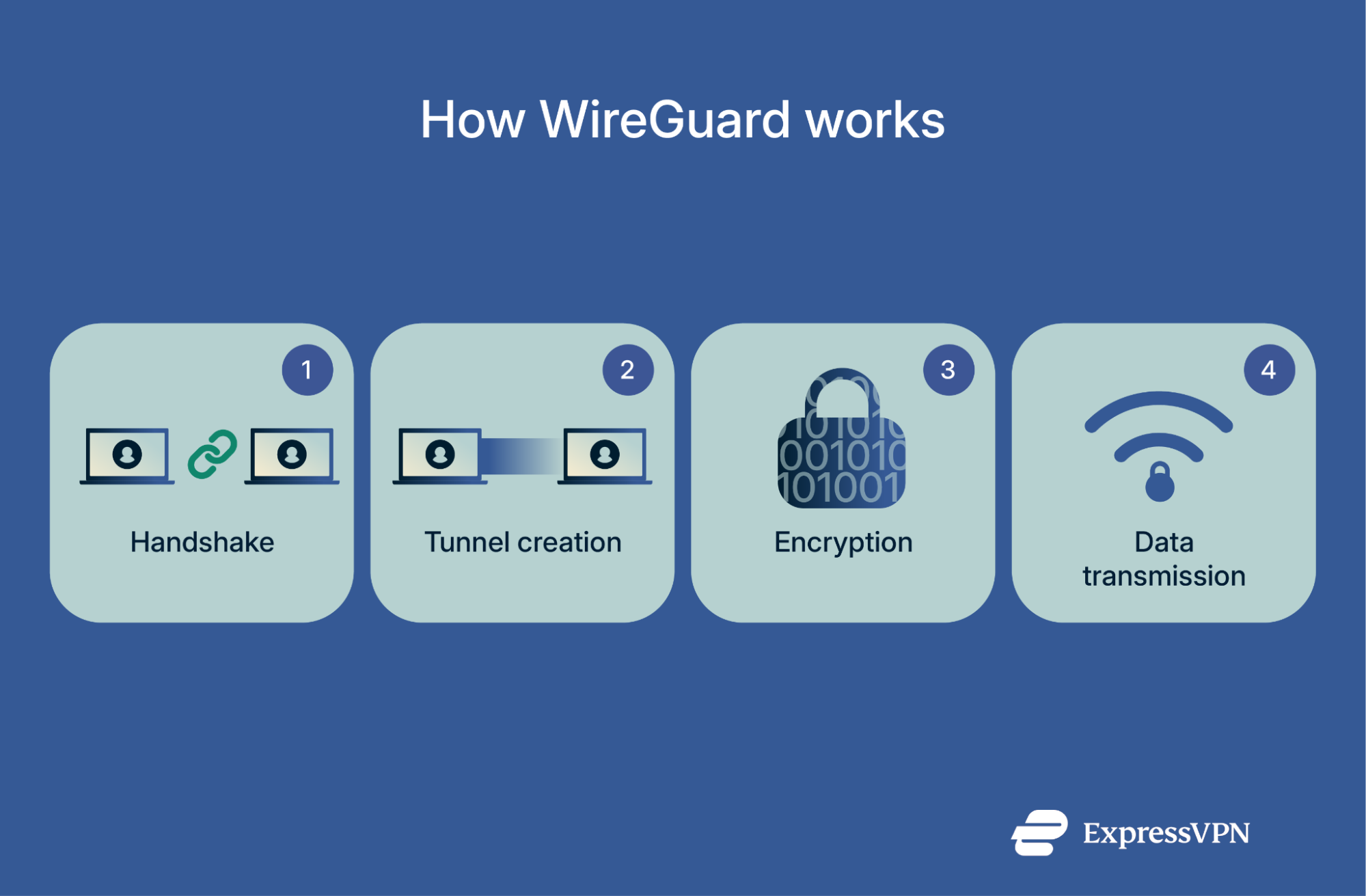 This revolutionary functionality has helped WireGuard become one of the most used VPN protocols of modern times. It’s particularly popular in settings where speed and ease are of the essence, such as peer-to-peer (P2P) networking, edge computing, streaming, gaming, and remote work setups.
This revolutionary functionality has helped WireGuard become one of the most used VPN protocols of modern times. It’s particularly popular in settings where speed and ease are of the essence, such as peer-to-peer (P2P) networking, edge computing, streaming, gaming, and remote work setups.
Learn more: Read why ExpressVPN built post-quantum WireGuard.
Comparing IPsec and WireGuard: Performance, security, and more
Next, let’s dig into the details of WireGuard vs. IPsec, exploring how these two protocols compare in a range of key categories, from speed to security, ease of use, and VPN compatibility. By the end, you should have a much clearer picture of which one is best for you. Here’s a quick comparison:
| WireGuard | IPsec | |
| Speed | Faster, lower latency | Fast, but performance varies depending on configuration |
| Security | Highly secure, uses modern algorithms | Secure, but depends on which algorithms and settings are used |
| Ease of use | Simple and lightweight, with minimal disconnects | More complex to set up, but offers greater flexibility |
| Compatibility | Works on most modern platforms, less support for older devices | Excellent compatibility, including many legacy systems |
Speed and latency
When it comes to speed and network performance, WireGuard is one of the very best VPN protocols around. Thanks to its minimalist code and modern encryption technology, it runs exceptionally quickly and efficiently, so users shouldn’t notice much or even any major latency when using this protocol. This makes it a good choice for data-heavy activities, like gaming or streaming.
IPsec, meanwhile, typically requires more resources and can’t quite compete with the more lightweight and speedy WireGuard. Indeed, testing of the two shows that WireGuard consistently outperforms IPsec-based protocols in this area, with better results in both latency and throughput.
However, it’s important to note that IPsec speeds can vary greatly, depending on its configuration. L2TP/IPsec, for example, tends to be notably slower than most modern protocols, like Lightway and WireGuard, but IKEv2/IPsec is a faster option, particularly on mobile devices.
Security and cryptographic strength
Security is a core pillar of WireGuard’s design. The fact that it has such a small, lightweight VPN codebase makes it easy to audit and secure. Researchers and cybersecurity experts have dug into the code, formally verifying its cryptographic algorithms and implementation. WireGuard security is also powered by some of the most recent and strongest cryptographic algorithms, like ChaCha20-Poly1305 for encryption and Curve25519 for secure key exchange.
IPsec, meanwhile, offers a bigger and broader range of encryption options, though the levels of security can vary from one configuration to the next. To provide the highest standards of protection, IPsec-based VPN protocols have to be carefully and correctly configured. Its larger codebase makes it a trickier protocol to audit and potentially puts it at greater risk of cyberattacks.
Privacy considerations
While security is at the heart of both WireGuard and IPsec, privacy is handled differently.
WireGuard doesn’t dynamically assign IP addresses by default. This can make it easier to link a user to a specific IP over time if the VPN provider does not implement additional measures. To protect privacy, providers often rotate IP addresses or use ephemeral keys, ensuring user activity can’t be easily traced.
IPsec, in contrast, offers more flexibility in managing IP addresses and sessions. Its configuration options allow providers to implement privacy protections more directly, without requiring the same level of protocol tweaks.
In practice, both protocols can provide strong privacy, but WireGuard relies on provider adjustments to achieve the same level of anonymity that IPsec can offer more natively.
Ease of use and configuration
As far as VPN setup and configuration are concerned, WireGuard is one of the more straightforward VPN protocols to work with. It was made with simplicity in mind, and it shows; WireGuard doesn’t deal in open connections or tunnels, simply focusing on forwarding encapsulated data packets to their destination.
Thanks to this, WireGuard users tend to notice fewer disconnects and more streamlined usage, on the whole. Additionally, WireGuard can easily reconnect if and when any disconnect occurs or if the device’s IP address changes (like a mobile device switching from Wi-Fi to data). This, again, makes it an appealing choice for the likes of remote workers and travelers.
IPsec, meanwhile, is considered quite tricky to configure, partly because of the many different configuration options available. There are extra layers of complexity in its design when compared to WireGuard, and if communications between the client and the server get disrupted or cut, even momentarily, the whole connection can be lost.
However, while IPsec can run over both Transmission Control Protocol (TCP) and User Datagram Protocol (UDP), WireGuard is UDP-focused. This affects how data is transmitted. Since UDP doesn’t verify packet order or integrity, some data may arrive out of order or incomplete. This makes WireGuard less ideal for applications like torrenting, but its lean codebase and UDP focus make it well suited for streaming, gaming, and other real-time activities.
Compatibility across platforms and devices
Since it’s been around for several decades already, IPsec is well integrated into all major operating systems and devices, new and old. It’s part of the Windows and Android operating systems and natively supported on iOS, too. Various routers also support IPsec, and its broad compatibility is one of its biggest advantages.
WireGuard is a widely adopted VPN protocol that’s part of the Linux kernel and supported across many platforms, including mobile devices through VPN apps on Android and iOS. While it’s generally favored for its speed and simplicity, it may have limited compatibility with some legacy systems, which can make deployment on older or more diverse networks more challenging.
Network efficiency and overhead
IPsec is widely regarded as a flexible VPN protocol, though its efficiency can vary, depending on its configuration. It supports both IPv4 and IPv6, with various encryption and authentication algorithms available, so the overall efficiency and overhead levels of one IPsec VPN connection can be quite different from the next.
WireGuard is more lightweight and speedy, thanks to its minimal codebase and small selection of cryptographic algorithms. It generally carries out handshakes more quickly than IPsec and delivers speedy, efficient connections with less latency and smaller overhead. This is one of the reasons why it tends to run faster and smoother than IPsec-based protocols.
Community adoption and modern support
With IPsec being around since the last century, it has been very widely adopted by enterprises, organizations, and even governments. It’s supported in firewalls, routers, and VPN clients, as well as major OSs, with a vast array of open-source implementations available and extensive communities of developers and network experts who use it.
It may be older now, but IPsec is still relevant to modern users. It’s part of the Windows operating system and offers strong backward compatibility with older devices while also featuring on brand-new ones, like commercial routers from leading brands. At the same time, its complexity can make it an intimidating choice for modern users used to more accessible IPsec alternatives.
WireGuard hasn’t been around long compared to IPsec, but it has established itself quickly and gained support and adoption on many platforms. It’s a protocol option in many major VPN clients, with support growing on mobile and desktop devices, and while its support community may be smaller than IPsec’s, it’s active and growing fast.
Real-world use cases and scenarios
Both IPsec and WireGuard are in use on a daily basis in various settings and scenarios, but one is usually preferable to the other in most situations.
Remote work setups
Remote work is on the rise, with more and more people doing their jobs from home offices or on the go, and many remote workers use VPNs to keep their connections and data safe. For this purpose, both WireGuard and IKEv2/IPsec are strong contenders.
WireGuard stands out for its speed, stability, and ability to maintain connections when switching networks, which is an advantage for mobile and on-the-go workers. It’s also lightweight, which helps reduce latency during video calls or large file transfers.
IKEv2/IPsec, on the other hand, is a long-established favorite in corporate environments. It balances speed and security, offers excellent support across devices, and integrates well with enterprise systems, making it a reliable choice for employees connecting to company networks.
Internet of Things (IoT) and edge computing
WireGuard is an increasingly popular choice for VPN connections in edge computing, since this approach tends to work best when there are secure and rapid connections leading back to central data centers. The lightweight and high-performing nature of WireGuard makes it a fitting option in this field, and its low CPU and memory footprint allows it to work on even small and simple devices. It’s also becoming more widely supported on modern IoT devices.
At the same time, not all IoT and embedded devices support WireGuard natively, which can limit its use in certain environments or networks that have a mixture of old and new hardware. In such situations, the stronger compatibility of IPsec may prove useful, as many IoT devices support it right out of the box.
Companies deploying new smart devices, for example, may like to use IPsec, since those devices likely already support IPsec technology without any extra installs or applications. However, IPsec still has some weaknesses from an IoT perspective, such as the fact that it has a larger codebase, which can open up additional vulnerabilities, and it can be quite tricky to configure for beginner users.
Streaming and gaming
Streaming and gaming are both data-intensive activities that rely heavily on speed. As such, it’s important to choose a VPN protocol with high speed and stability, low latency, and efficient operations, and WireGuard certainly fulfills all of those criteria. It’s widely regarded as one of the top protocols for these kinds of activities due to its lightweight nature and strong performance metrics.
IPsec can’t quite match WireGuard for speed in most cases and has higher latency, with variable overheads and issues with connection drops or disruptions from time to time. This, combined with the fact that it’s more complicated and time-consuming to configure and manage, makes it a less attractive option for gamers and streamers, except in specific environments, like a business setting where WireGuard isn’t allowed or supported.
High-compliance industries
In industries that are subject to strict compliance regulations, like finance, healthcare, law, and governmental work, IPsec is one of the better VPN protocols to turn to. This is due to the fact that it’s well established in the enterprise world and part of various industrial standards for digital security.
It’s recognized by numerous compliance frameworks and authorities and functions well on large, diverse networks, even those that include legacy devices. The downside is that it can require quite complex configuration and management, so enterprises wishing to get the best out of IPsec VPN connections will usually need their own in-house IT experts to set them up.
WireGuard may become more prevalent in these kinds of industries in the future and has many of the necessary components to work well in business settings, like strong cryptographic algorithms and lightweight, easily auditable code. But it’s still growing and establishing itself, and it doesn’t yet have the same deep and broad ecosystem as IPsec.
Final verdict: Which protocol is right for you?
Overall, both WireGuard and IPsec can work well at encrypting data and securing your online connections, but as this guide has shown, they work in different ways and excel in completely different areas.
For situations that call for speed and simplicity, WireGuard is inarguably the better choice. It’s faster, smoother, and simpler to set up, with excellent stability on the whole and high modern standards of security.
For situations that demand more flexibility, more widespread compatibility, or compliance with strict regulations, IPsec is still usually the right choice, though this may change with time as WireGuard becomes more widely adopted and established.
FAQ: Common questions about WireGuard vs. IPsec
Can WireGuard replace IPsec?
In many scenarios, yes, WireGuard can replace Internet Protocol Security (IPsec), delivering advantages in many metrics, like speed, simplicity, and security. It’s regarded as the superior choice for personal use, remote work setups, and situations where speed and efficiency are of the utmost importance. However, WireGuard may not be seen as a viable replacement in certain enterprise settings where the compatibility and reliability of IPsec make it the preferred choice.
Is IPsec the most secure VPN?
No, Internet Protocol Security (IPsec) isn’t regarded as the most secure VPN protocol by experts, with the likes of Lightway, OpenVPN, and WireGuard generally offering higher standards of security. IPsec’s security depends on its configuration. It can offer strong data protection in certain settings and when used in conjunction with Internet Key Exchange version 2 (IKEv2) and the more modern, proven algorithms, but it can also have weaknesses and vulnerabilities because of its complicated configuration.
Is IPsec outdated?
Not entirely, as Internet Protocol Security (IPsec) is still widely used for secure tunneling in VPN connections, often combined with Internet Key Exchange version 2 (IKEv2). However, many experts agree that it’s becoming increasingly obsolete as other, better-performing alternatives continue to gain prominence, like Lightway and WireGuard.
Take the first step to protect yourself online. Try ExpressVPN risk-free.
Get ExpressVPN




